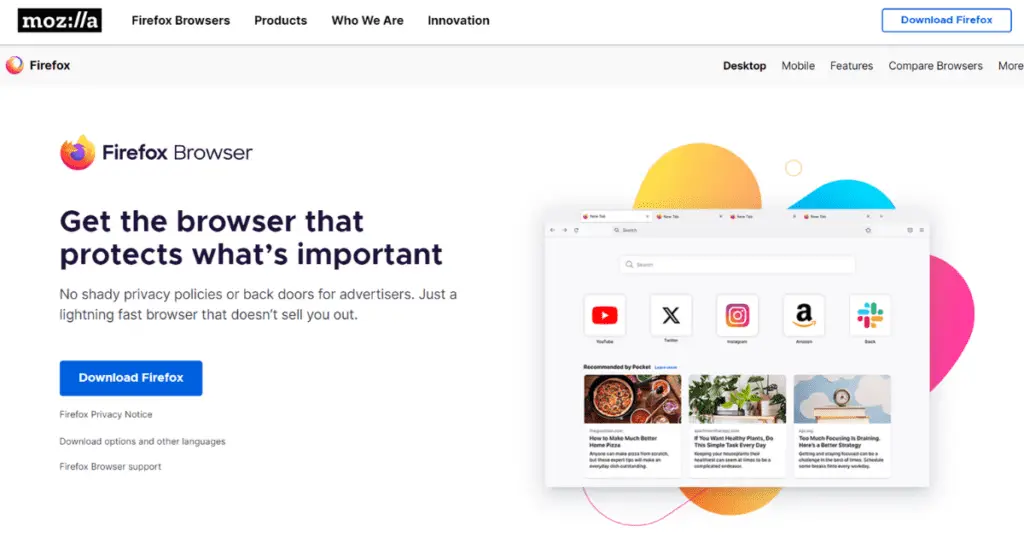Is Firefox browser safe for regular use? Get my sincere opinion on its privacy and safety features and discover if it’s the proper choice for your everyday browsing needs.
Selecting the right browser is critical for online protection. I’ve used Firefox for years, and it’s clear that Mozilla prioritizes privacy and safety.
But is Firefox genuinely secure to use nowadays? I’ll share my experience, revelations, and insights into Firefox’s safety features in this article.
We’ll discover how Firefox protects your statistics and whether it’s the proper preference for your surfing needs. Let’s dive into what makes Firefox a famous choice for privacy-conscious users.
What is Mozilla Firefox Browser?

Firefox is a free, open-source internet browser developed by Mozilla, a nonprofit organization. It aims to offer a steady and personal surfing experience. I like how distinctive it is from many other browsers.
It’s no longer just about speed; it’s also about respecting your privacy. Firefox supports multiple platforms, including Windows, macOS, Android, and iOS, making it versatile for any tool.
With ordinary updates and vital community help, Mozilla ensures that Firefox remains ahead regarding safety and performance. In terms of capability and privacy, it’s superb stability.
Is Firefox Browser Safe to Use?
Yes, Firefox is designed with user safety in thoughts. It offers robust safety capabilities, like Enhanced Tracking Protection, which blocks third-party trackers by default. From my experience, this indicates fewer disturbing ads and less worry about websites monitoring my browsing conduct.
Firefox also includes built-in phishing and malware protection, which protects you from keeping statistics from online threats.
One of the standout features of online is its automated security updates. These updates ensure that liabilities are patched quickly, reducing the chance of cyberattacks.
What I recognize most is Mozilla’s transparency; they privately review, making it clear how they manage personal info. Firefox stays sturdy and dependable and desires privacy. For anyone concerned about maintaining online privacy and choices, choice
How Does Firefox Browser Work?
Firefox is built with the Gecko engine, which helps render web pages quickly and correctly. Its architecture ensures a smooth and steady surfing experience. Here’s a better observe the way it capabilities:
- Gecko Engine: Processes HTML, CSS, and JavaScript to display websites.
- Enhanced Tracking Protection: Blocks third-party cookies and trackers by default.
- Sandboxing Technology: Isolates browser strategies to prevent dangerous code from affecting your tool.
- Private Browsing Mode: Doesn’t keep records, cookies, or shape records.
- Automatic Security Updates: Keeps you blanketed with modern-day security patches.
- Add-Ons and Extensions: Customizes capability whilst maintaining protection.
This combination of capabilities ensures that Firefox promises pace and safety at some stage when surfing.
How to Install Firefox Browser on Windows: A Step-by means of-Step Guide.
Installing Firefox on Windows is simple and secure if you comply with the proper steps. Here’s how you can get began:
- Visit the Official Mozilla Website: Go to mozilla.Org to ensure a secure install.
- Click ‘run Firefox’: The web page will automatically hit upon your Windows version.
- Run the Installer: Locate the downloaded report and double-click to start the installation.
- Follow the Setup Wizard: Click “Next” and accept the phrases to continue.
- Choose Install Location: Select your preferred vicinity or preserve the default.
- Launch Firefox: Once mounted, click “Finish” to open Firefox.
- Customize Settings: Adjust privacy and protection settings for safer browsing.
- Sign In to Sync: Log in with a Firefox account to sync bookmarks and passwords across gadgets.
Pros and Cons of Using Firefox Browser
While Firefox has a lot to offer, it’s important to understand both its strengths and limitations. Here’s a quick overview:
| Pros | Cons |
|---|---|
| Enhanced privacy and tracking protection | Uses more memory compared to some browsers |
| Open-source and regularly updated | Not as integrated with Google services as Chrome |
| Customizable with add-ons and themes | Slightly slower page loading times in some cases |
| Strong security features like DNS over HTTPS | Fewer extensions compared to Chrome |
| Independent from large tech companies | May require more manual setup for some features |
Is Firefox a Search Engine or a Browser?

No, Firefox isn’t a search engine but an internet browser. A web browser like Firefox permits you to access websites and content online. It translates the code at the back of internet pages and displays them in a user-friendly way.
While Firefox has a default search engine—which includes Google, Bing, or DuckDuckGo—you may exchange this for any search engine you choose.
Think of Firefox as the tool for navigating the web. At the same time, search engines are the equipment for finding unique records within it.
Is Firefox Safer than Chrome?
Yes, Firefox is regularly considered safer than Chrome in terms of privacy. Firefox blocks third party trackers by default, meaning fewer agencies can track your online sports.
It additionally uses advanced safety capabilities like Enhanced Tracking Protection and DNS over HTTPS, which help guard your browsing information. Unlike Chrome, which Google owns, Firefox was developed by Mozilla, a nonprofit organization emphasizing user privacy.
While both browsers have sturdy safety features, Firefox’s dedication to privacy gives it an edge for people who prioritize defensively keeping their private records online.
Does Firefox Browser Track Your Data?
No, Firefox no longer tunes your facts in the same manner that many different browsers do. Mozilla, the organization behind Firefox, is dedicated to consumer privacy.
They have applied capabilities like Enhanced Tracking Protection, which routinely blocks third-birthday celebration trackers and cookies.
This method is one website to cumulate data about behaviourfing behaviour without difficulty. Firefox also offers gear like the Facebook Container, preventing social media platforms from monitoring your interest across specific websites.
While it does collect minimal facts to improve the browser’s performance, you can manipulate and limit this information through privacy settings.
Is Firefox Browser Better than Chrome for Privacy?

Yes, Firefox is often considered better than Chrome in terms of privacy. Mozilla’s open-supply browser prioritizes consumer privacy with functions like Enhanced Tracking Protection, which blocks third party cookies and fingerprinting.
Unlike Chrome, Firefox doesn’t proportion user facts with a big tech organization like Google. I discovered that Firefox’s privacy settings are extra transparent and more straightforward to customize, allowing you to manipulate how a good deal of information websites can accumulate.
While Chrome offers a few privacy alternatives, it’s more centred on collecting statistics for personalized advertisements. For privacy-targeted customers, Firefox is a strong choice.
Top 6 Firefox Browser Features You Should Know
Firefox is packed with features that enhance both security and user experience. Here’s a breakdown of the top six features that make Firefox a standout choice:
| Feature | Description |
|---|---|
| Enhanced Tracking Protection | Blocks third-party cookies and trackers, giving you more privacy while browsing. |
| Private Browsing Mode | Prevents the browser from saving history, cookies, and site data, keeping your sessions private. |
| Firefox Monitor | Alerts you if your email address is part of a known data breach, helping you stay secure. |
| DNS over HTTPS | Encrypts your DNS requests, making it harder for attackers to see which websites you visit. |
| Customizable Extensions | Allows you to add various extensions for ad-blocking, password management, and more. |
| Sync Across Devices | Syncs bookmarks, passwords, and history across your devices for seamless browsing. |
Top 5 Alternatives to Firefox Browser
While Firefox is a great choice for privacy-conscious users, there are several other browsers that offer unique features and security options. Here’s a comparison of the top five alternatives to Firefox:
| Browser | Key Features | Best For |
|---|---|---|
| Google Chrome | Fast browsing speed, extensive extension library, deep integration with Google services. | Users in the Google ecosystem |
| Brave | Built-in ad blocker, rewards users for viewing ads, strong focus on privacy. | Ad-free browsing |
| Microsoft Edge | Fast performance, integrated with Windows, built on Chromium for compatibility. | Windows users |
| Safari | Optimized for Apple devices, energy-efficient, strong privacy controls. | Apple ecosystem |
| Tor Browser | Routes traffic through multiple servers for anonymity, strong focus on privacy and censorship resistance. | Maximum privacy |
Is Firefox Browser Safe for Android Devices?
Yes, Firefox is secure for Android devices. It has the same strong privacy capabilities as the desktop model, like Enhanced Tracking Protection, which blocks trackers and undesirable advertisements.
Additionally, Firefox for Android includes an integrated password manager, which facilitates keeping your login info secure. The cellular version also supports accessories, allowing you to customize your browsing experience and protect yourself with gear like advert blockers.
I admire how Firefox provides a continuing sync feature, making it clean and allowing me to keep my facts stable across devices. For Android users, it’s a reliable desire for privacy and security.
Is Firefox Browser Safe for iPhone Users?

Yes, Firefox is safe for iPhone customers. It provides robust privacy functions similar to those on the laptop model. Enhanced Tracking Protection blocks undesirable trackers, and the personal surfing mode guarantees that your browsing records remain private.
What I find mainly useful is that Firefox for iOS integrates easily with Apple’s privacy-targeted surroundings, including an additional layer of protection.
It also includes an integrated password supervisor and syncs with different gadgets, making it easy to keep your data stable. For iPhone users looking for a browser that respects their privacy, Firefox is a solid choice.
Final Words:
After exploring Firefox’s safety and features, it’s clear that this browser is stable and desirable for folks who value privacy and protection. With its strong tracking safety, open-supply nature, and commitment to transparency, Firefox sets itself apart from other browsers.
Firefox is superb for avoiding intrusive monitoring while enjoying a clean browsing experience. Whether you operate Windows, Android, or iOS, Firefox’s safety functions allow you to stay secure online.
Ultimately, the best browser will depend on your unique needs. However, Firefox remains a straightforward choice for many customers.
FAQs:
Yes, Firefox’s browsing mode prevents tracking. It continues your surfing history, cookies, or website facts, imparting a more excellent private experience.
Firefox is stable because it uses strong encryption, ordinary safety updates, and features like Enhanced Tracking Protection to dam trackers and malware.
No, Firefox is advanced and maintained by Mozilla, an independent, non-earnings organization centred on consumer privacy.
Yes, antivirus software is recommended for extra safety against malware and phishing attempts, despite Firefox’s integrated protection functions.
Firefox has integrated protections against phishing and malware and encryption to secure your information from hackers.








2 thoughts on “Is Firefox Browser Safe for Everyday Use? My Honest Review”